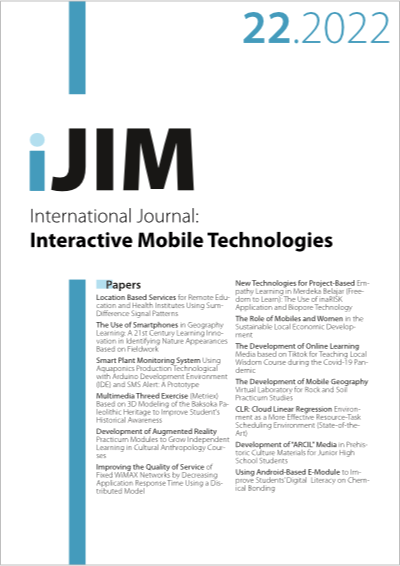Development of Augmented Reality Practicum Modules to Grow Independent Learning in Cultural Anthropology Courses
DOI:
https://doi.org/10.3991/ijim.v16i22.36161Keywords:
practicum module, independent learning, cultural anthropologyAbstract
The specific purpose of this development is to develop a practicum module containing augmented reality (AR) which is used for Cultural Anthropology courses which are arranged systematically, and refers to clearly measurable learning objectives. The specification of the innovation product developed is in the form of a practicum module containing augmented reality (AR) which is used for the Cultural Anthropology course in the even semester with the name Augmented Reality Based Cultural Anthropology Module or Modul Antropologi Budaya Berbasis Augmented Reality (MABAR). This development is of course also based on several other reasons, namely based on the results of interviews with several students who have taken the Cultural Anthropology course, it was revealed that: 1) students have difficulty understanding one of the materials about anthropological works (ethnography), 2) when doing practical going to the field to conduct mini-research based on ethnography, students find it difficult because there is no systematic practicum guide. The research method used is the research and development method with the Borg and Gall development cycle model. There are 10 steps in R & D developed by Borg, Gall, and Gall. The conclusion in this development research is the feasibility of MABAR. The results of the development refer to the results of the assessment of material experts, media experts, and limited trials in the form of student responses. The average score of expert validation results, namely material experts is 85% in the very feasible category, while the results of media expert validation are 88% in the very feasible category, and the average student test results are 86.5% in the very feasible category. Thus MABAR is declared feasible to be used in the learning process.
Downloads
Published
How to Cite
Issue
Section
License
Copyright (c) 2022 Nurul Ratnawati, Neni Wahyuningtyas, Habibi, Ferdinan Bashofi, Mohd Shahril Nizam Shaharom

This work is licensed under a Creative Commons Attribution 4.0 International License.



